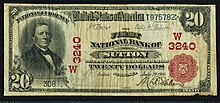Hugh McCulloch
As Secretary of the Treasury 1865–1869 he reduced and funded the gigantic Civil War debt of the union, and reestablished the federal taxation system across the former Confederate States of America.
Born in Kennebunk, Maine, he was the son of Hugh McCulloch Sr., one of the largest shipbuilders in New England, and Abial Perkins.
He was educated at Thornton Academy in Saco, Maine, and attended Bowdoin College for two years, leaving due to ill health.
[5] As he was about to leave the White House, Abraham Lincoln took him by the hand and said : "We must look to you, Mr. Secretary, for the money to pay off the soldiers", to which he replied: "I shall look to the people... they have not failed us thus far, and I don't think they will now".
[6] Immediately confronted with inflation caused by the government's wartime issue of greenbacks, he recommended their retirement and a return to the gold standard.
[3] In McCulloch's first annual report, issued on December 4, 1865, he strongly urged the retirement of the legal tenders or greenbacks as a preliminary to the resumption of specie payments.
McCulloch was also disappointed by the decision of the United States Supreme Court upholding the constitutionality of the legal tenders.
Soon after the close of his term of office McCulloch went to England, and spent six years (1870–1876) as a partner and member of the banking firm of Jay Cooke, McCulloch & Co.[7] Their firm received from the Secretary of the Navy, George M. Robeson, the contract for the deposits made in London for the payment of naval officers abroad, with most partners being close friends of General Grant.
[8] His partner, Jay Cooke, was the chief financier of Lincoln's Union Army, and was the proprietor of America's premier banking house before his fall.
[9] From October 1884 until the close of President Chester A. Arthur's term of office in March 1885, McCulloch again served as Secretary of the Treasury.
[11] The Civil War had been financed primarily by issuing short-term and long-term bonds and loans, plus inflation caused by printing paper money, plus new taxes.
By early 1867, postwar prosperity was a reality, and the optimists wanted an end to contraction, which Congress ordered in January 1868.
Susan was the aunt of Albon P. Man, cofounder with William E. Sawyer of the Electro-Dynamic Light Company, competitors of Thomas Edison.
His greatest challenges came in building the brand-new national banking system during the war, and afterwards refinancing the enormous Union debt.
The biggest puzzle was dealing with $428 million in greenbacks, in an age where McCulloch like all orthodox economists, rejected paper money.
This contraction policy removed money from circulation, lowered prices, wages and profits, and put heavy pressures on debtors.
The chief authority for the life of McCulloch is his own book, Men and Measures of Half a Century (New York, 1888).




